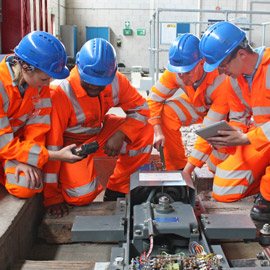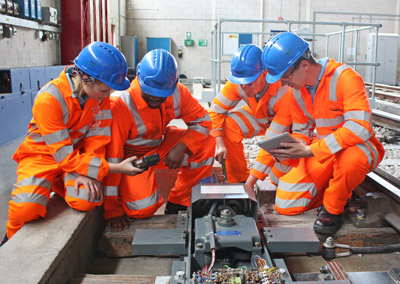Rail development impact on the job market
Posted: 20 January 2016 | | No comments yet
Neil Wilkie of Fusion People looks at current and future rail development infrastructure projects and the impact they have on the rail industry job market helping to fill the skills shortage gap. Currently, the UK’s railways are undergoing several projects that will transform the rail network. Plans to unite the north and south with the […]


Neil Wilkie of Fusion People looks at current and future rail development infrastructure projects and the impact they have on the rail industry job market helping to fill the skills shortage gap.


Currently, the UK’s railways are undergoing several projects that will transform the rail network. Plans to unite the north and south with the HS2 railway and increase London’s rail capacity are so extensive that these projects will help the engineering sector thrive as opportunities present themselves to both experienced and newer engineers.
The UK’s engineering sector needs over 2 million new workers within the next 5 years to meet the rising demand for various projects throughout the UK. The billions of pounds being invested into current and future rail projects will help create jobs for engineers across the country from senior to apprentice levels to help fill the skills gap.
HS2 is preparing to cut 32 minutes off a standard commute from Birmingham to London. To do this a whole new railway line needs to be installed that will allow trains to reach speeds of over 250mph. Currently, it is expected that the rail line and custom built trains will provide over 70,000 jobs for engineers, architects and construction workers throughout the UK.
UK engineering sector needs over 2m workers within 5 years to meet demand of rail development projects
Other rail projects will also demand the support of skilled engineers, London’s Crossrail will create an extra 30,000 jobs that will be crucial to the success of the project. Rail projects are looking for more ways to leave a lasting legacy on the industry and the Crossrail has already opened up more than 400 opportunities for apprentices, with the potential for more in the future.
On top of this there is already a dedicated training academy tied to the project which will create the next generation of hardworking engineers, designers and construction workers fully equipped with an expert skillset tailored specifically to the project.
The Crossrail project also benefits the UK’s job market through the allocation of contracts. Over 95% of the construction and engineering contracts have been given to British companies with 61% of those going to contractors outside of London.
The project is also having a positive effect on industries outside of the rail sector. Between 2008 and 2013, approved planning applications have seen a 41% increase thanks to the Crossrail project. Commercial and residential properties in the area are also set to benefit as over £5.5 billion worth of value.
The Crossrail project also plans to enhance the commuter journey by developing stations around London. The biggest transformation will be the four story leisure complex named ‘Crossrail Place’ being built at Canary Wharf.
The electrification of the Great Western rail network will also add opportunities for those working in and outside of the rail industry. Electricians at all levels of experience and disciplines are required to make the transition from diesel to a cleaner, greener electric rail line.
The electrification project will not only cut down on carbon emissions and become more efficient, it will also free up maintenance budgets so more investments into the development of rail networks can begin.
This new influx of work may be what is needed to reinvigorate interest in engineering careers. Although experts are in demand there is also room for those trying to break into the sector and engineers looking for their next challenging project.
These exciting rail projects should encourage more people to study STEM subjects and continue training to become engineers. The skills shortage is a serious concern for the engineering industry but these projects will leave a legacy of experienced engineers that began as apprentices and through their work on Britain’s railways gained the expertise to continue their career.
Another problem facing the engineering job market is the lack of representation for women within the industry. Engineering has always been a male dominated sector and despite women outnumbering men in almost two-thirds of university subjects, they are still vastly underrepresented in STEM degree subjects.
It’s hoped that the variety of interesting engineering roles on offer across the lifespan of these projects will encourage more women to engage with the STEM subjects that are crucial to filling the skills gap currently looming over Britain.
The railway projects are already underway and are due to be completed in the coming years. In the meantime, the engineering industry will have a variety of different roles, allowing engineers of all disciplines to fulfil their potential and create a platform for development.






